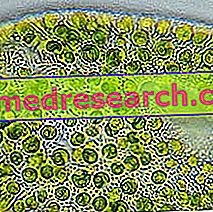Definition
The term "cholestasis" is used to indicate a condition characterized by an alteration in the flow of bile, which normally from the liver and gall bladder reaches the duodenum.
Cholestasis is not considered a true pathology, but a condition that can be associated with different types of diseases.
Causes
As mentioned, cholestasis can be associated with different types of diseases.
Among the main diseases that can cause cholestasis, we mention: bile duct tumors, liver pathologies, the presence of calculi in the common hepatic duct, bile duct stenosis, tumors of the liver or pancreas, acute viral hepatitis, Sjögren's syndrome, sarcoidosis, sepsis, tuberculosis, sclerosing cholangitis and primary biliary cirrhosis.
Furthermore, the abuse of alcohol and the use of certain types of drugs can also promote the development of cholestasis.
Symptoms
The main symptom of cholestasis is the itching of the skin.
Other characteristic symptoms that can manifest are: light stools, dark urine, nausea, vomiting, jaundice and digestive difficulties with steatorrhea.
In the event that cholestasis is caused by the presence of stones in the bile ducts, patients can also perceive a very intense pain in the upper part of the abdomen, which can extend to the back of the trunk.
Information on cholestasis - drugs for the treatment of cholestasis is not intended to replace the direct relationship between health professional and patient. Always consult your doctor and / or specialist before taking cholestasis - cholestasis treatment drugs.
drugs
The therapeutic approach that one decides to undertake depends on the primary cause that has favored the development of cholestasis. Therefore, the treatment will be aimed at treating the pathology underlying the impairment of bile flow.
However, some medications can be used to reduce some of the symptoms induced by cholestasis.
More precisely, the symptomatic treatment of cholestasis is aimed at giving relief to patients from the annoying cutaneous itching that characterizes it. The active ingredient most commonly used to achieve this is cholestyramine administered orally. Alternatively, the doctor may decide to prescribe patients a short treatment with topical corticosteroid drugs.
Finally, it is good to remember that during the treatment of cholestasis and the primary causes that have caused its development, it is very important that patients do not take toxic substances for the liver, such as alcohol, fried fats and some types of drugs.

cholestyramine
As mentioned, cholestyramine (Questran ®) is the first line drug used to treat the annoying skin itching that occurs in patients with cholestasis.
Cholestyramine is a drug available for oral administration as a powder for oral suspension.
When used for the treatment of the itching associated with cholestasis, the usual amount of colestyramine used is 4-8 grams per day, to be taken before meals.
Corticosteroids
For the treatment of the main symptom that characterizes cholestasis - that is skin itching - the doctor may decide to prescribe the administration of corticosteroid drugs for topical use.
However, due to the side effects that these drugs can cause, their use should only take place under the strict control of the doctor himself and only for short periods of time.
Among the various active ingredients that can be used, we recall:
- Betamethasone (Ecoval ®, Beben ®): betamethasone is a corticosteroid available in different formulations for cutaneous use, among which we find creams, emulsions, cutaneous solutions and ointments. Generally, it is recommended to apply the product directly on the affected area once or twice a day, or according to the doctor's judgment.
- Dexamethasone (Dermadex ®): Dexamethasone for skin use has specific therapeutic indications for the symptomatic treatment of itching and is available as a skin cream.
Usually, it is recommended to apply the dexamethasone cream two or three times a day directly on the affected area. In any case, the frequency of administration and the duration of treatment must be established by the doctor.
- Hydrocortisone (Locoidon ®, Dermirit ®): hydrocortisone is indicated for the symptomatic treatment of various skin disorders, among which we find, indeed, itching. It is advisable to apply the product for skin use based on hydrocortisone 1-2 times a day, directly on the affected area, or according to the doctor's prescription.



